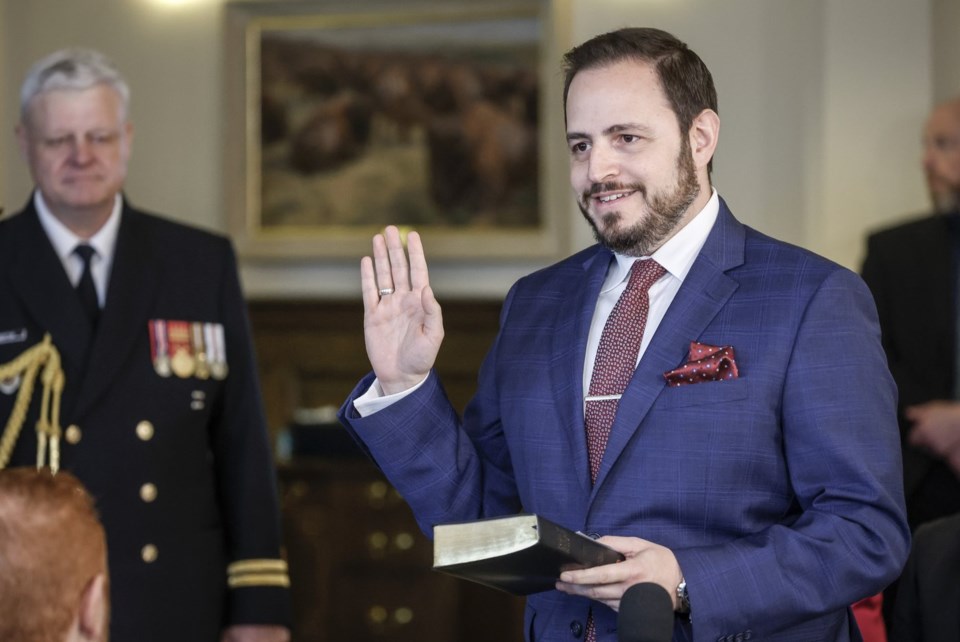EDMONTON — The head of the Alberta Teachers' Association declined Friday to commit to launching a provincewide strike despite last-minute contract talks with the province hitting the ditch.
Union president Jason Schilling and his executive have been granted a mandate by 51,000 rank-and-file members to hit the picket lines, but must first give three days' notice.
Asked by reporters if a strike would be called, Schilling declined to answer directly, saying instead, "Ideally, we'd like to see a negotiated settlement that doesn't involve any kind of job action, but we have to see what ongoing negotiations or talks will come about."
The contract impasse comes as hundreds of thousands of students are set to return to classrooms next week.
Schilling emphasized it is up to the union's executives to decide whether teachers go on strike, but when asked if students will be in school next week, he replied, "Yes, they will."
Just under 740,000 students were registered last year in public, Catholic and francophone schools, where potential job action could affect learning.
Schilling said teachers have only received a 5.75 per cent wage increase in the past decade, a rate that makes it difficult to recruit and retain.
"Teachers cannot accept a salary offer that doesn't attract and retain Alberta teachers by catching up and keeping up with inflation," he said. He said the union tried to secure solutions to address class sizes and complexities but was shut down by the government.
"Parents should be challenging the government about why they (are) undervaluing public education and the people who work with them."
Earlier Friday, at a news conference in Calgary, Education Minister Demetrios Nicolaides said the province’s latest offer, born out of three days of last-minute bargaining, should have been acceptable.
"Unfortunately, it's becoming increasingly clear that the Alberta Teachers' Association union leadership is only interested in playing politics with our kids," Nicolaides said.
"Parents should be furious that union leaders are gambling with their kids' future and their learning."
He added, "For months (teachers) have been talking openly about the need to increase funding, hire more teachers, improve working conditions and provide more supports for teachers.
"However, we have now learned that wages are their main concern," Nicolaides said.
"I'm not sure what's happening, but we cannot and will not play politics with our kids."
Schilling said it's "disingenuous" to say teachers only care about wages at this point, since salaries are typically hammered out toward the end of the negotiation.
The province has offered a 12 per cent pay increase and to hire 3,000 more teachers over the next three years.
Finance Minister Nate Horner, speaking alongside Nicolaides, said the province looked to teachers’ salaries in other provinces for comparison and found 12 per cent to be the ceiling.
"We want all of our occupations to be paid the going rate and that's what the data shows," Horner said.
"I don't see that offer changing because the data doesn't show that it should."
Horner also said, given the news Thursday that low oil prices were pushing Alberta into an even bigger forecasted budget deficit position this year — $6.5 billion — he doesn't think Alberta can afford a bigger pay bump for teachers.
Teachers had already voted down the 12 per cent figure earlier this summer, and Schilling said Friday the promise to hire more teachers is a "drop in the bucket" and barely enough to cover population growth, let alone reduce class sizes.
"When half of new teachers in our profession leave within the first five years of their career, the message is clear: the education system in Alberta is unsustainable," Schilling said.
"It's time for government to step up with a fair deal for teachers, because a fair deal for teachers is a good deal for kids."
Schilling also denied that the union has politicized anything.
"We are showing the reality of what is happening within our schools in Alberta," he said.
"The fact that they don't have the very things that they need to do their jobs all while watching their salaries fall further and further behind is not politicizing, it's telling the truth."
He declined, when asked, to offer the specifics of what wage offer teachers might accept, saying that conversation should be had at the negotiating table.
Schilling also said the province is putting more work on teachers' plates without proper resources, and that's angering them.
He pointed out they will need to comply with new provincial rules like book restrictions, parental consent requirements and special approvals for sexual education materials.
This report by The Canadian Press was first published Aug. 29, 2025.
Lisa Johnson and Jack Farrell, The Canadian Press



